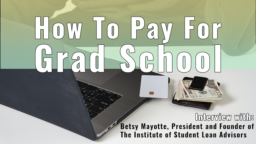TUN sits down with Betsy Mayotte, the president and founder of The Institute of Student Loan Advisors (TISLA), to provide tips on how to pay for grad school.
TUN: Betsy, thanks so much for joining.
MAYOTTE: No problem. Thanks for having me.
Grad school is a big investment. Before we get into the details, do you have any advice on what financial factors students should consider before deciding whether or not grad school is the right move for them?
I do. Sadly, the times of education for education’s sake, and this breaks my heart, unfortunately, that’s just not the world we live in anymore. So, you really want to do a return on investment analysis when you are considering entering grad school.
Get an idea of how much debt you’re going to have to take on — not only how much debt will you be taking on, but what will that in terms of a monthly payment? What’s the average starting salary for the career that you want to enter into? Do a budget based on the average starting salary for that career and then see if the numbers make sense.
Great. So, free money is always better than borrowed money. Before we talk about student loans, what other financial aid options are out there for aspiring grad students?
There’s not as much free money for grad students as there is for undergrad students. But, there are grants, and especially if you’re in the maths and the sciences, there are still quite a few scholarships out there.
There are some great free scholarship searches that I would recommend. You don’t need to pay for help with that. The College Board has a good free scholarship search. Finaid.org also has a good free scholarship search, and so does Mapping Your Future. All three of those organizations are nonprofits, and they don’t charge for their scholarship searches.
Another option for getting a graduate degree and reducing the cost of reducing the borrowing, although it might take a little longer, is try to find an employer with tuition reimbursement and take advantage of that tuition reimbursement.
Maybe don’t go full-time. You work full-time, but don’t take on the debt. Essentially, get that degree for free.
Great. Now let’s move on to student loans. How can students apply for and receive federal student loans for grad school? Is the process similar to undergrad?
It’s the same. First, you fill out the Free Application For Federal Student Aid (FAFSA). The other benefit to that is, if there are grants available, or if the school has institutional scholarships, they’re going to start with the FAFSA to award those as well.
Once you’ve filled out the FAFSA, you’re going to get an award letter from the school. Part of the award letter is going to be your loan eligibility and then you go from there.
Great. What type of loans are available, and do students get to choose which type of loan and how much money they borrow?
Yes, yes and sort of. Graduate students can also get Stafford Loans, and that should be the first loan that they max out on before they hit any other loans.
Grad students, unfortunately, now can’t get subsidized Stafford Loans. They can only get unsubsidized Stafford Loans, so you should also get in the habit of paying at least some, if not all, of the interest on a monthly or quarterly basis so that debt doesn’t grow.
If the Stafford Loan doesn’t cover your cost of attendance and you need other loans, grad students can get Graduate Plus Loans, which are also unsubsidized. There’s no limit on that. The limit is the cost of attendance minus any other aid. But, I caution you. Just because you can borrow that amount doesn’t mean you should borrow that amount.
If the tuition reimbursement isn’t enough, maybe you could at least use it to reduce the borrowing that you have to do.
Great. So, when would you advise students to take out private student loans?
Never.
I’ve been working with student loan borrowers for longer than I care to admit to you. There are very few borrowers I haven’t been able to find a solution for, but all of those borrowers have been private loan borrowers.
Maybe they can get a lower interest rate, but that doesn’t do you any good if you can’t afford the payment. And you end up getting cosigners involved, and maybe they can’t afford the payment.
I just got an email this week from someone who co-signed like $200,000 of their child’s private student loans. They’re retired and their only income is social security. Now their child can’t pay the private loans, so they’re getting collection notices and they’re getting threatened with a lawsuit by the lender.
So, private student loans, to me, are a “never.”
Great. So, we talked about scholarships. I know there are a couple of other options, such as becoming a TA, for students to get money off. Can students assess these options before applying to school?
When you’re determining the school you’re going to attend, those are things to look for. Do they have ways to reduce tuition? If it’s an out-of-state school, maybe you can be a resident assistant and you don’t have to pay room and board, which can really rack up the cost.
So, those are all things that you can look for ahead of time before you even apply to the institution.
Great. Thanks, Betsy, for taking the time to join us today.
Of course. Thank you for having me.
This interview has been edited for clarity.



